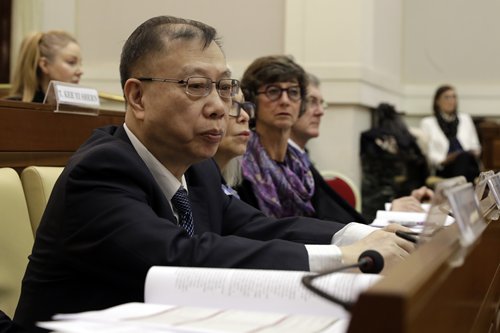
Professor Huang Jiefu, head of the Chinese National Organ Donation and Transplantation Committee, attends a conference on "Organ Trafficking and Transplant Tourism," held in the Vatican City, February 7, 2017. Photo: IC
Senior Chinese health officials declared war on the illegal harvesting and trafficking of organs at a Vatican City conference in early February, reaffirming the country's zero-tolerance policy toward the underground industry.
"The practice of using organs from executed prisoners, which is essentially the illegal trade in organs and corruption in China's organ donation and transplant system, will be punished severely by law in the future," Huang Jiefu, head of the National Human Organ Donation and Transplant Committee, told the Global Times on Monday after his trip to the Vatican.
Huang, a former vice minister of health, was at the center of media attention after he told reporters during the conference that the organs of executed prisoners may still be being used in transplant operations, a controversial practice which was officially banned in China in 2015.
Huang insisted that it is unrealistic to say that this practice is not illegally continuing somewhere in China, such as in underground clinics, though the country has a resolute attitude and strict laws against violations.
Wang Haibo, head of the China Organ Transplant Response System, who also attended the Vatican meeting, said questions about this practice are often loaded.
"No one can guarantee there are absolutely no violations of the law, not only in China, but also anywhere in the world, and the most important thing is whether there are laws and punishments that apply to criminals," Wang told the Global Times on Monday.
China's Regulations on Human Organ Transplantation enacted in 2007 banned the trading of organs nationally, and was followed by steps to criminalise the unauthorized trading of organs in 2011, a crime for which the death penalty can be handed down in severe cases.
Since 2007, China has apprehended 32 intermediaries involved in the organ trade, arrested 174 criminal suspects including 50 medical personnel, investigated 18 medical institutions and closed 14 underground operation theaters, the Xinhua News Agency reported on February 8.
"China's honesty on this issue is one of the reasons it was accepted by international society, and this attitude also led to a shift from the country being questioned and criticized by international society to China being supported by many," said Huang.
Influential communities such as The Transplantation Society (TTS) previously erected an academic embargo that prevented Chinese physicians who transplanted organs from executed prisoners from presenting their findings at international congresses, publishing articles in medical journals and achieving membership of the TTS.
However, this changed after China made voluntary donations the only legitimate transplant channel.
The annual TTS international congress was held in Hong Kong in August 2016 and two months later, Beijing held the 2016 China International Organ Donation Conference, the first such international meeting held on the Chinese mainland.
Wang was also elected to the board of councilors of The Declaration of Istanbul on Organ Trafficking and Transplant Tourism Custodian Group to serve from 2016 to 2018, after the TTS suggested him for this role.
When experts discuss why China has gone from being criticized to now being involved in international organ transplant conferences, most of their comments involve the word "change." For example, Marcelo Sanchez Sorondo, chancellor of the Vatican's Pontifical Academy of Sciences, told AP on February 7 that "we believe truly that they want to change, and that they are changing."
From end to beginning
However, making changes is difficult, said Huang, adding that the years when executed prisoners' organs were used bred networks of corrupt intertwined interests which are hard to break and require the collaboration of different government bodies.
Moreover, the challenge of stamping out criminality is compounded by the shortage of voluntary organ transplants.
According to a press release from the National Human Organ Donation and Transplant Committee, China's total number of annual organ donations ranks first in Asia and second in the world, a number that is increasing year on year.
However, as a consequence of China's relatively low organ donation rate - 2.98 people per million donate their organs - only around 10,000 of the 300,000 people who needed organs actually received such operations as of the end of 2015, Xinhua reported.
In the eyes of many donation specialists, one of the biggest obstacles to organ donation in East Asian countries is a cultural preference for interring the dead whole, with all their organs intact. However, the gradual growth in transplants shows that this cultural taboo is not an unconquerable obstacle, said Wang.
In addition, as government policies are helping to promote donation, China is setting a good example, Wang noted, citing May 2016 transport reforms which aimed to speed up organ deliveries.
The move, which mobilizes the country's health, police and transport systems, reduced delivery times and sets an example of including civil aviation authorities in organ transport, as organ deliveries in many countries are accomplished via pricey medical charter flights.